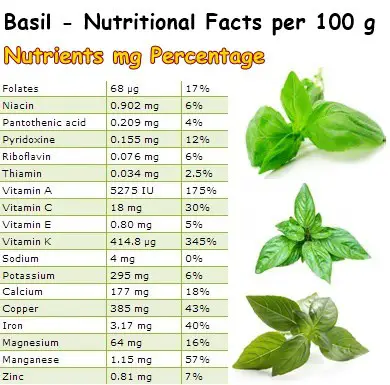This savory Asian aromatic herb has become so popular that it has become a piece of Italian culinary history. Basil (Ocimum basilicum) is one of the main flavor-giving ingredients in the famous pesto sauce, alongside garlic, pine nuts and olive oil. But more important, basil is a strong antibacterial and antioxidant food with great benefits for human health. It exerts a particularly beneficial action on eye, muscle and bone health, but also contributes to a strong immune system and supports cardiovascular health.
Full of flavor due to a combination of essential oils and rich in minerals, vitamins A and K and potent antioxidants, basil makes both a great aromatic herb to spice up everyday cooking and a healthy addition to any diet. Regular consumption helps prevent calcium and cholesterol plaques on artery walls, encourages blood coagulation, supports muscle function and protects against cell damage and subsequent disease caused by harmful free radicals.

Types of basil and their uses
Although this aromatic herb comes in a wide range of varieties, sweet basil is generally the preferred choice in most culinary ventures, while holy basil is used for relaxation purposes, especially in aromatherapy. When cooking with basil, it is recommended to either use the herb fresh by adding it at the end of the cooking process or gently cook it, enough to leave its flavor in the food, but not too much so that it loses its aromatic taste. Like any other spice, condiment or aromatic herb, basil owes its scent to a combination of aromatic essential oils, in this case eugenol, estragole, linalool, cineol, sabinene, myrcene and limonene.
Basil benefits and uses
The essential oils in basil have strong antifungal and antibacterial properties and thus inhibit the growth of bacteria such as Listeria monocytogenes (more deadly than Salmonella), Staphylococcus aureus, Pseudomonas aeruginosa (causes sepsis), Yersinia enterocolitica (causes yersiniosis) and Escherichia coli O 157:H7 (causes bloody diarrhea and kidney failure especially in children and seniors).
According to more recent research, pure basil extracts show great effectiveness in the treatment of several antibiotic resistant pathogenic bacteria. A study published in the July 2003 issue of the Journal of Methods in Microbiology showed that the essential oils in basil inhibited several strains of Staphylococcus, Enterococcus and Pseudomonas bacteria. Staphylococcus, for instance, causes boils, breast infections, urinary tract infections, even pneumonia and meningitis, as well as food poisoning. Consumption of raw basil leaves is believed to offer the same protection against bacteria and infections naturally.

The eugenol flavor compound in basil is renowned for its applications in modern dentistry as a potent antiseptic and anesthetic. Eugenol also boasts a strong anti-inflammatory activity similar to that of ibuprofen and paracetamol, two modern medicines which block an enzyme that regulates inflammation levels in the body.
However, estragole, another essential oil in basil leaves and the main constituent of basil oil, has been shown to have carcinogenic activity in mice, as reported by the European Medicines Agency in a report entitled ‘Public statement on the use of herbal medicinal products containing estragole’. Nevertheless, the same study states that the carcinogenic effects observed in mice were a result of a dose of pure estragole 100-1000 times higher than the maximum intake we could get from dietary sources.
The truth is that there are natural carcinogens everywhere in nature, yet diets rich in natural foods were shown to promote DNA repair and even cure cancer, not the other way around. Ultimately, the decision to include or to exclude certain foods from your diet is yours, regardless of what anyone tries to convince you of. As long as you stay informed and listen to the needs of your body, you will definitely make the right choices for you.

If you take a look at the nutritional table above, you will notice that basil is an excellent source of vitamin A (175% of the recommended daily intake, RDI). Being rich in vitamin A, basil promotes retina health and vision acuity, strengthens the immune system by supporting the production of white blood cells and maintaining healthy mucous membranes as well as contributes to skin health.
Basil is also a good source of vitamin C (30% of the RDI), a potent antioxidant-vitamin which protects cells against free radical damage and prevents chronic disease by reducing inflammation in the body. In addition to this, basil consumption offers great antioxidant protection as a result of the herb’s good manganese content (57% of the RDI) and helps prevent iron deficiency due to a good iron content (3.17 mg).
Basil is an amazing source of vitamin K, 100 g of fresh herb providing 345% of the RDI. A good vitamin K intake ensures calcium is deposited in bones, thus supporting a strong bone frame and helping prevent osteoporosis and, at the same time, prevents it from depositing onto artery walls, thus helping in the prevention of atherosclerosis. The vitamin K in basil also reduces the levels of a glycoprotein responsible for inflammation leading to heart disease.
Conclusion
There are many reasons why basil consumption is beneficial for you. Cardiovascular health, bone strength and inflammatory conditions can be significantly improved by regular, but moderate consumption of both basil and other herbs and spices. Herbs and spices in general are incredible sources of unique antioxidants and anti-inflammatory compounds which may add many years to our lives.
